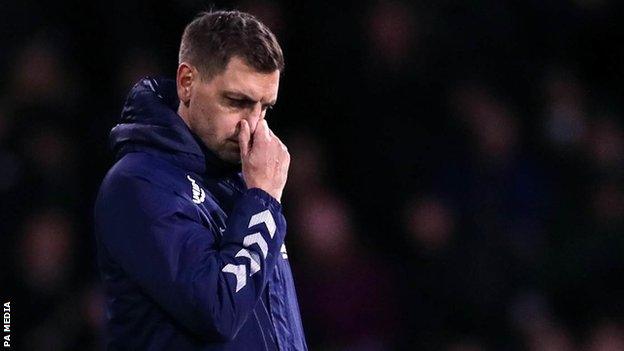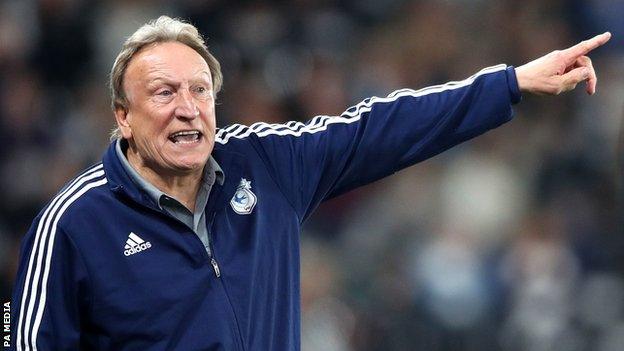Jonathan Woodgate: Why did his dream appointment at Middlesbrough not work out?
- Published

Former England defender Jonathan Woodgate's playing career included spells at Leeds, Newcastle, Real Madrid, Tottenham, Stoke and Middlesbrough before he was appointed Boro head coach on 14 June last year
Middlesbrough is in Jonathan Woodgate's heart and soul.
It is his hometown, the club he supported as a boy and where he wore the red shirt for 112 of his career appearances.
So, when he was appointed head coach of the Championship club little more than a year ago, it seemed the perfect fit.
Yet, the journey is already over, following chairman Steve Gibson's decision to replace the 40-year-old with veteran boss Neil Warnock, as the Teessiders' battle against relegation for the final eight games of the season.
What happened for the man Gibson described as "one for now, one for next year and certainly one for the future" on his appointment, to be cast aside?
A 'brave, new' beginning
Woodgate replaced the experienced Tony Pulis, whose promotion bids proved unsuccessful, and whose direct style of play had alienated a large number of supporters.
Suddenly, here was a man who wanted to bring flair and finesse back to Teesside.
"It was a change of tack, you went from a grizzled old campaigner to the hope or promise of a brave new way of playing," BBC Radio Tees' Boro commentator Mark Drury told BBC Sport.
"Woodgate said in interviews with us he wanted fast, attacking football; to promote young players and work with the youth system - and that was a big part of the decision."
There was, as Drury described it, "a lot of goodwill" towards Woodgate - but not all fans were convinced.
"Because he cared, it's his club and the way he talked about playing, who wouldn't want to watch that? You want it to work," Drury continued.
"A large proportion of the fanbase looked on it as the cheap option. But as he himself said - 'There are plenty of people who don't think I should have this job, and I'll have to deal with that'. He knew what wicket he was batting on from the beginning."
Some bright spots, too many losses

All nine of Boro's wins this season have come in the Championship
Time out of the Premier League has been costly for Boro, and money staked on promotion which did not come to fruition left Woodgate with the task of trimming the squad.
Experienced, senior professionals such as Aden Flint, John Mikel Obi and Stewart Downing departed, followed later by Martin Braithwaite and Darren Randolph.
In their place, Anthony Dijksteel, Marcus Browne and Marc Bola were recruited - all players with potential who had impressed in the third tier.
"People inside the club, knew it was going to be a difficult season, and I said if we finished above half-way it was going to be a good season for us," said former Middlesbrough midfielder Neil Maddison, now a BBC pundit.
"I think for Jonathan that was the remit. But the League One signings didn't quite work, the performances had been up and down."
Drury added: "The squad is just not as strong as it was this time last year. What they wanted to do was find younger, cheaper promising players from League One, bring them on and possibly sell them on, but it hasn't worked."
While there have been positives - with Drury pointing to home-grown left-back Hayden Coulson as one who has acclimatised well to first-team life - results have been Woodgate's downfall.
November's midweek win over Barnsley was only their third success of the season, and came on the back of a 10-game run without victory.
Four straight wins over the Christmas period pointed to a brighter 2020, but just one further victory since - culminating in Saturday's 3-0 home defeat by Swansea - saw Boro tumble into difficulties, with just goal difference keeping them out of the bottom three.
"There have been moments of real quality, winning at West Brom, who were unbeaten at home, and winning at Preston, who had the best home record in the division," Drury said.
"There have just been too many long winless runs either side."
Middlesbrough - a tough job for anyone?
Woodgate's promotion from backroom staff to his first head coach role coincided with new challenges for Boro, in terms of finances and squad rebuilding.
By comparison to his predecessors, Woodgate had little of the money granted to Gordon Strachan or Aitor Karanka, did not have the managerial experience of Tony Mowbray and was not given the time allocated to Gareth Southgate, who was similarly a 'rookie' appointment.
"Because money was and is a big issue to deal with, in the sense of the financial fair play regulations, Boro were coming to the end of the parachute payments and had a squad which was too expensive," Drury added.
"He, like any manager coming in at that point, let alone one in their very first job, had a real big task on their hands, which was to reshape an expensive squad and completely overhaul the playing style."
Back to the old-school

New Middlesbrough boss Neil Warnock left his last job a manager of Cardiff City in November
With stakes high in the Championship, Gibson has turned to a battle-hardened old hand in Warnock to drag Boro to safety during the run-in.
While the 71-year-old has enjoyed four top-flight promotion successes, from Notts County in 1991 right the way through to Cardiff in 2018, he also lists second-tier survival bids with Crystal Palace and Rotherham on his CV.
"With Neil Warnock you've got a wealth of experience, a manager that has been in certain scenarios so many times on and off the pitch," Maddison said.
"That experience in these final eight games is going to be absolutely vital."
Drury added: "He is the obvious appointment. No manager knows this division like Neil, at both ends of the table."